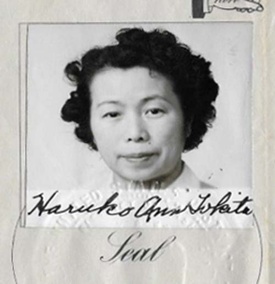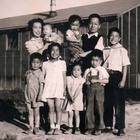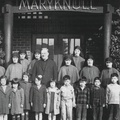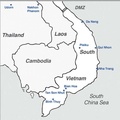The North American Post Editor’s note: Tokita’s present-day recounting of Issei and Nisei life is rare today. It is possible largely because his mother arrived as a 12-year-old with her parents from Japan in 1919. Thus, while she was indeed an immigrant, she was what Korean Americans call “1.5 generation,” a person culturally halfway between adult immigrants and second-generation children born in the U.S. According to author Mary Yu Danico, writing on KA 1.5ers in Hawaii, “1.5ers have been socialized in both Korean and American cultures and express the cultural values and beliefs of each.”
SOME of the music my mother sang during her lifetime included the Japanese nursery songs, “Otete Tsunaide” and “Chi Chi Pappa.” Yet she also sang while producing the plunk, plunk, plunk of the Japanese shamisen and the “tararan, tararan, tararan” of the Japanese koto. She also chanted the “Uuraji” of Japanese shigin.When my father was alive, we had a number of records that he played over and over again when we were living at the Cadillac Hotel before World War II. I remember many of the melodies but very few of the words to the songs that were played.
The music came from old 78 rpm records that were kept spotlessly clean and stored neatly after they finished playing. Since the record player was the kind that played one at a time before the advent of multiple stacked records, Papa and Mama were constantly changing records when each finished.
Later on, when WWII started, Papa destroyed all the Japanese records and threw them away. Mom told me years later that Papa thought the records might reveal our loyalty status if the government ever checked on us.
Some of the earliest songs I knew were the nursery songs that Mom sang to me and my seven siblings. Because I heard the songs over and over as each new sibling came along, I knew most of them by heart.
“Otete Tsunaide” talks about holding hands and joining others doing the same thing. “Chi Chi Pappa” is about how baby birds sound when they first hatch from their eggs and are sitting in their nests waiting and chirping for the food the parent birds would bring them.
These were the songs that Mom had time to sing to me and my siblings when Papa was alive. When he passed away, late in 1948, she was always a little too busy to sing them to the youngest ones.
Later on, as Mom became financially established by becoming a rather successful business woman, she started taking lessons on various Japanese musical instruments as her time allowed.
First, she sang while plunking along with the shamisen. It is a three-stringed banjo-like instrument that in my opinion, does not offer much in the way of melodic characteristics. But, she seemed to enjoy playing it because the music for it did not involve quick hand movements or difficult notes.
As more time allowed and my youngest sibling, Yaeko, became old enough and interested enough to indulge in music and musical instruments, Mom moved on to the melodic Japanese koto. It is a multi-stringed version of the harp that lies lengthwise on the floor, perpendicular to the musician.
They both took koto lessons and practiced at home, which was much more pleasant to listen to than the shamisen. When the two of them played together, it was actually a joy to listen to. In fact, they became quite a duo and skilled enough to be invited to play for a number of gatherings in Japanese communities in and around Seattle, Tacoma and Olympia.
Then, there was the agony of shigin, classical Japanese poetry chanted to music. When Yaeko grew older and lost interest in the koto, Mom joined a group which indulged in the classical music singing that to me, sounded like someone suffering from a stomach ache. Mom was not very accustomed to Japanese classical music when she began, so things were a little testy. At any rate, when Mom and some of her friends came to practice at home, it was time for me to find other things to do rather than stay at home.
Then there were the English songs that Mom sang from time to time. Some were Christian hymns she sang whenever Christmas and other religious songs were being played at home. We were raised as Catholics so on occasions when holiday songs were being played, Mom would pipe in with “Jesus Loves Me” or “Onward Christian Soldiers,” which she learned before she was married through attending the Japanese Congregational Church on 17th Avenue.
However, the music situation that shocked me the most was when a number of popular songs came on the radio one day. I started singing along with one song when Mom started singing with me! I could not believe she knew the words to that song! I asked her how she knew that song; she explained, rather disgustedly, that it was popular when she was growing up. As I pondered that, the Charleston came on and guess what? Mom started dancing the Charleston, legs bending in and out with her hands over each knee just like I had seen in newsreels about the 1920s! I must have been quite a sight because my Mom broke into a huge, bent over laughing spell over my open-mouthed, shocked expression! I stood there overwhelmed, at the sudden realization that…
MY MOM WAS YOUNG ONCE, TOO!!
© 2023 Shokichi “Shox” Tokita







